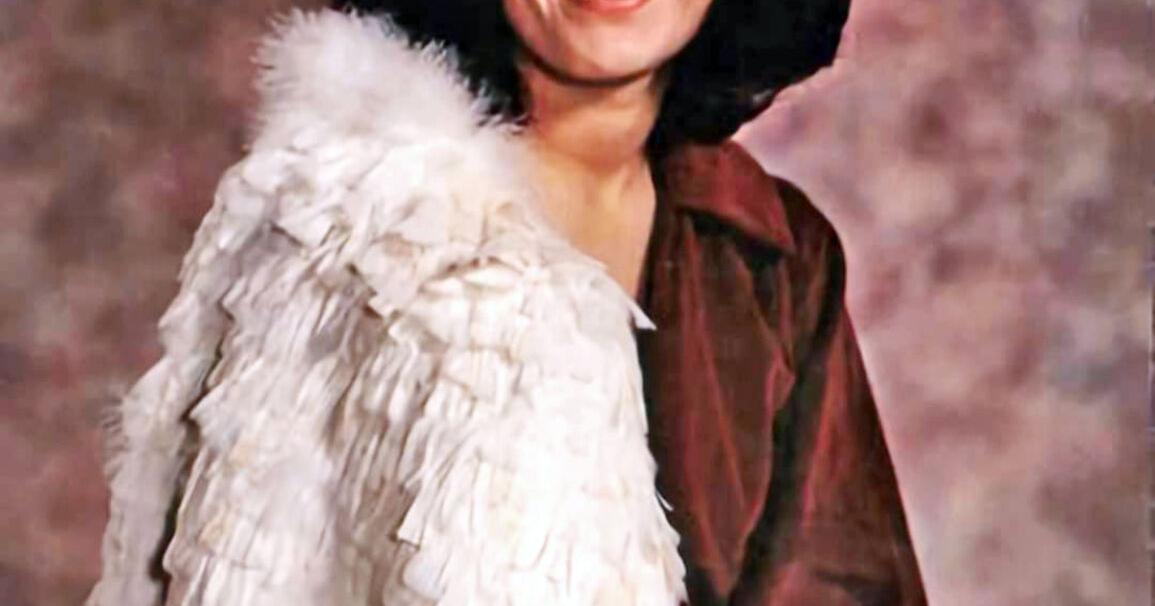
TAHLEQUAH – Virginia Alice Stroud, a Cherokee-Muscogee Creek painter and a well-respected member of the Native American art community died Nov. 8 in Tahlequah. She was 73.
Stroud and her adopted sister Sharron Ahtone Harjo (Kiowa) were instrumental in reviving ledger art in the 1970s. In the 1960s, the Cherokee tear dress was invented for Stroud to wear as she represented Cherokee people as Miss Indian America. Until 1969, Miss Cherokee representatives had to create their outfits using commercial beaded crowns and buckskin dresses. In 1969, that all changed when Virginia Stroud wore a tear dress, turkey feather cape and a copper crown.
The dress, crafted by her sister, Elizabeth Higgins, became a “cherished emblem” of Cherokee identity. Additionally, Stroud was the first Miss Cherokee to wear the white turkey feather cape, made by Wynona Day, and gifted to her at the 1970 Cherokee National Holiday. Her grace and representation of Cherokee tradition captivated many while she held these leadership roles, said her family.
Born on March 13, 1951, in Madera, California, Stroud’s journey led her to Muskogee, Oklahoma, following the loss of her mother, Eliza Beaver, when she was thirteen. She found solace and purpose in the vibrant tapestry of her cultural heritage and the loving embrace of her sister, Elizabeth and brothers Don and Roger Stroud.
Stroud began her artistic journey drawing and creating at a very young age, and sold her first painting at the age of 13 at the Philbrook American Indian Art Show in Tulsa. Her educational journey included graduating from Muskogee High School in 1969 and attending Bacone College in Muskogee, where she studied art with Professor Richard West. Her artistic abilities continued to flourish at the University of Oklahoma, setting the stage for a remarkable career that celebrated and helped preserved Native American culture.
Stroud’s artistic medium of choice ranged from acrylic and gouache to fine art printmaking. She also ventured into writing and illustrating children’s books, drawing from ancient pictographs and historical ledger art, designing for Pendleton Woolen Mills and the Porcelain American Indian Life and Legends Company, and published by Book Partners, LLC. Her narrative style was distinctive, featuring minimal facial details and exuberant floral backgrounds. Her artistry extended to kinetic wooden sculptures and fine art furniture, each piece a narrative of her people’s legacy.
Her works are included in prestigious art collections including the Gilcrease Museum, Millicent Rogers Museum, Philbrook Museum of Art, Fred Jones Jr. Museum of Art, Cherokee Heritage Center, National Museum of the American Indian and Cherokee Nation Entertainment collections, to name a few. Her philosophy was simple yet profound: “I paint for my people. Art is a way for our culture to survive … perhaps the only way.” Her family said her philosophy is a testament to the depth of her commitment to her people and culture and earned her numerous accolades, including being the youngest Native artist to win first place in the Woodlands division of the Philbrook Museum’s annual juried art show in 1970, Artist of the Year by the Indian Arts and Crafts Association in 1982, Master Artist by the Five Civilized Tribes Museum in 1986, and the prestigious Cherokee Medal of Honor, Trail of Tears Award in 2000.
Most recently, she was featured alongside Oklahoma Native Female artists at the National Cowboy and Western Heritage Museum exhibition “Lighting Pathways: Matriarchs of Oklahoma Native Art,” which shined a spotlight on seven Indigenous women trailblazers.
Stroud’s family who will carry forward her legacy include her devoted son Tsali Jacob Cross of Portland, Oregon; her sister Elizabeth Higgins of Tahlequah; her brothers Roger Stroud (Ann Eggersgluss) of Defiance, Iowa, and Don and (Harriett Stroud) of Tahlequah; and her adopted sisters and brother and brother-in-law, Sharon Ahtone Harjo and Amos Harjo, Deborah Ahtone, and Harding Ahtone; and extended family Mary Adair and Mary Catherine HorseChief.
She is preceded in death by her parents, Thomas Walter Stroud and Eliza Beaver; her adopted parents, Jacob and Evelyn Ahtone; her brother Howard Ahtone; sister Levon Ahtone French; her brother Kenneth Walters; and her daughter, Tananeese Cross.
In a statement, her family said, “Virginia Stroud’s life was a vibrant tapestry of art, culture, and dedication to her heritage. Her spirit, creativity and thoughtful nature will continue to inspire and influence future generations. She leaves a rich legacy that will resonate in the hearts and minds of all who had the privilege of knowing her and experiencing her art. Virginia’s journey through life was one of purpose, passion and profound impact – a true testament to the enduring power of cultural expression and the human spirit.”
In lieu of flowers, please consider a memorial donation to the Murrow Indian Children’s in Muskogee.
